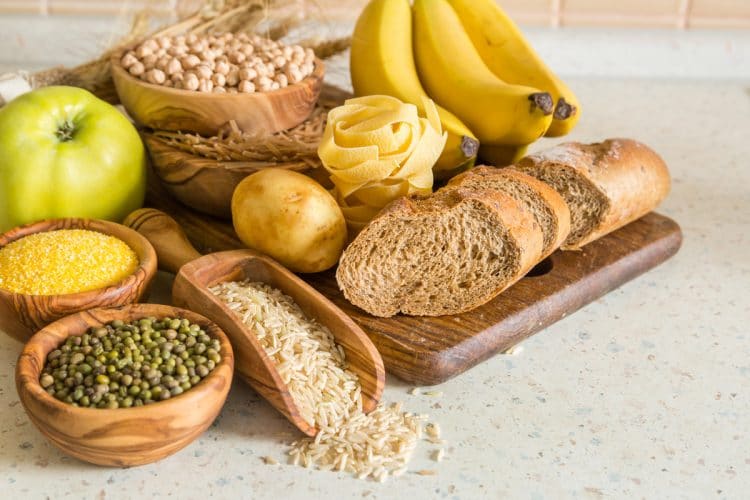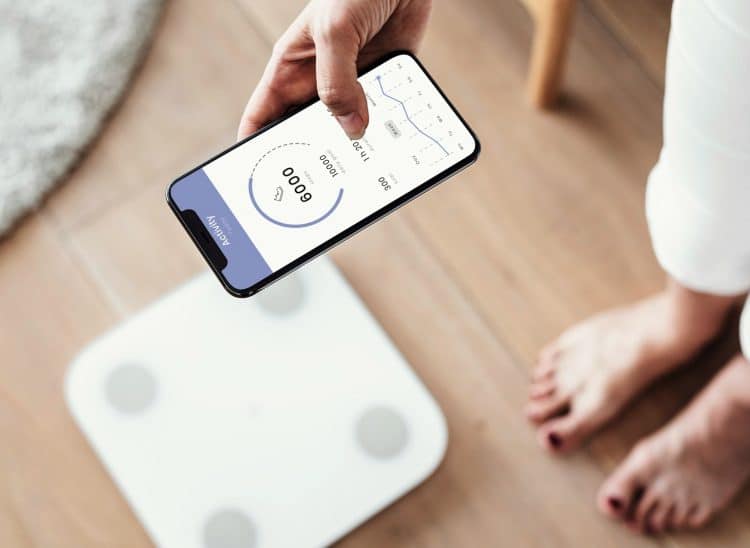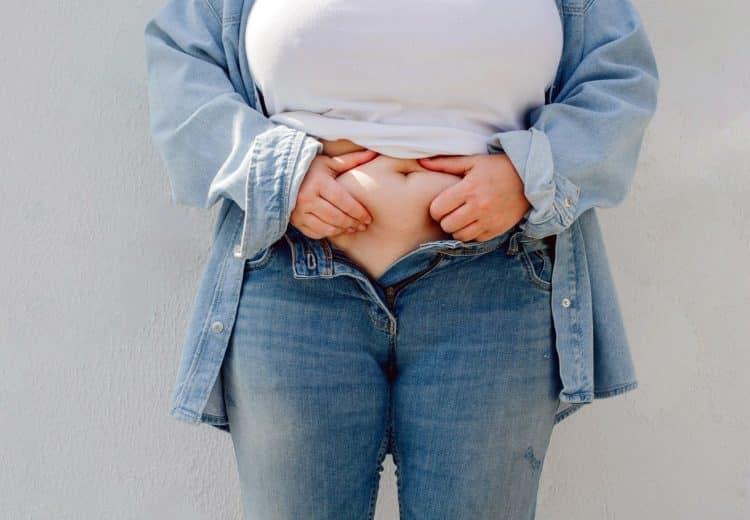Most exercisers have a strong interest in their body weight. In fact, most of us monitor our weight on a regular basis, for example, weekly. Regular weigh-ins will tell you if your diet and workout are on point or if you need to tighten up your eating habits. People trying to lose weight are usually even more “scale-aware.”
Of course, there is more to being healthy and fit than your scale weight. What your body weight is made up of is equally important. This is called your body composition and refers to the relationship between your fat mass and fat-free mass. Body composition is expressed as a percentage, e.g., 12%. The lower the percentage, the leaner and more defined you will be.
You can estimate your body composition here.
However, despite your best intentions, you may still find yourself gaining weight rapidly, such as ten pounds in a week. This is not uncommon, but it can be upsetting and frustrating.
Before you quit your diet and workout for good, it’s important to stop and investigate the cause of such a big weight jump. In many cases, rapid weight gain is easily explained.
In this article, we reveal the most common causes of rapid weight gain and what you can do to prevent it.
Six Most Common Causes of Rapid Weight Gain
Gaining ten pounds in a week can come as a huge shock, especially if you are currently trying to maintain or lose weight. The good news is that, in most cases, the explanation is simple, and the solution is easy to implement. The most likely causes of rapid weight gain are:
1. Water Retention

Your body is made up of about 60% water. Water is everywhere – in your muscles, blood, digestive system, and urinary system. Your body is constantly using and losing water, but it’s entirely possible to consume more than you need. Your body stores water so that it never runs out, and this is called water retention.
Occasionally, your body retains more than it needs, and water weight can increase beyond what is considered normal. Water is heavy stuff, and a single liter weighs one kilo or about 2.2 pounds.
Causes of water retention include:
- Consuming more sodium than usual – increases in dietary sodium or salt can cause water retention. For example, suppose you’ve been eating a lot of salty food lately, such as potato chips or take-outs. In that case, your water weight may temporarily increase.
- Using creatine – creatine monohydrate is a hydrophilic supplement which means it attracts water. If you’ve recently started using creatine, your body will retain extra water, especially within your muscle cells. One solution to this problem is to use creatine HCL instead of monohydrate. HCL does not cause water retention like monohydrate can. (Find your ideal daily creatine intake here)
- You haven’t been drinking enough water – weirdly, if you are in the habit of not drinking enough water, your body tends to store water in greater amounts. This survival mechanism is designed to keep you alive when water is in short supply, e.g., during a drought. Drinking more water will tell your body that it’s okay to release its excess water stores.
- Certain medications – some medications have side effects, and one common side effect is water retention. If you’ve just started taking a new medication, such as corticosteroids, and are gaining weight, that could be the cause. Read the information leaflet that came with your medicine, or ask your doctor, and you may discover the reason for your rapid weight gain.
2. Consuming More Carbohydrates Than Normal

Carbohydrates are one of the three macronutrient food groups. The other two are protein and fat. When you eat carbs, your body breaks them down into glucose. That glucose is either used as fast-acting energy or stored as glycogen in your liver and muscles.
Glycogen is glucose bound to water, and for every gram of glucose your body stores, it also retains three grams of water.
If you’ve been eating more carbs than usual, especially after a low-carb diet, your body will increase your glycogen stores and retain more water, which could explain your rapid weight gain.
[sc name=”style-blue-box” ]
For this reason, it’s usually best to introduce carbs gradually back into your diet after doing something like keto. This will prevent the glycogen rebound effect that causes rapid weight gain.
[/sc]
3. Undigested Food

If you weigh yourself before and after eating, you’ll almost always be heavier after a meal. That’s because the food you’ve just consumed is still in your stomach, waiting to be digested. This weight will soon vanish once the food is digested and used for energy, and the remains are eliminated from your body.
However, if you’ve got a sluggish digestive system, you may keep undigested food in your stomach and intestines for longer, leading to temporary weight gain.
For example, if you only poop every 2-3 days, a fair amount of food will accumulate in your intestines. Poop contains a lot of water, which will further add to your weight gain.
Ideally, you should void your bowels at least once a day. Constipation is a common problem usually caused by a low-fiber diet.
[sc name=”style-blue-box2″ ]
Drinking more water, eating more fiber, and being physically active can all help maintain regular bowel movements, so you don’t accumulate a lot of undigested food and waste in your stomach and intestines.
[/sc]
4. Menstrual Cycle
Most women’s monthly periods are accompanied by short-term weight gain, usually due to water retention. Changes in hormones cause fluctuations in water levels. In addition, some women also crave more carbs during their periods, so glycogen increases can also contribute to temporary weight gain. This is why many women report feeling bloated at certain times of the month.
[sc name=”style-blue-box2″ ]
Track your periods using an app, and you’ll probably be able to see recurring cycles of monthly, short-term weight gains. This will make any weight changes more predictable and easier to explain.
[/sc]
5. Inaccurate Scales

There is a good chance that your weight gain is not really weight gain at all but the result of inaccurate scales. After all, ten pounds is a LOT of weight, and if you haven’t been binge eating or recently went from keto to a high-carb diet, it’s actually pretty hard to gain ten pounds in a week.
To avoid weighing inaccuracies:
- Calibrate your scales to confirm they’re working correctly. Weigh something you know the weight of, such as a dumbbell. Zero the scales, so they show 0.00 when they’re empty.
- Change the batteries in electronic scales. Low battery levels can affect their performance. Also, make sure they’re on a hard, level surface. Wobbly scales and soft surfaces will lead to unreliable results.
- Weigh yourself at the same time every day. Your body weight naturally fluctuates as your hydration levels vary. For this reason, make sure you weigh yourself in the same physiological state each day, e.g., on rising and after you have been to the bathroom.
[sc name=”style-blue-box2″ ]
Even if you do these things, some daily weight variations are inevitable. Still, they should be relatively small, and you shouldn’t see fluctuations of ten pounds in a week.
[/sc]
6. Fat Gain

Bad news – not all rapid weight gains are temporary or related to water retention or scale malfunctions. Sometimes, you’ll gain weight because you’ve consumed too many calories. Unfortunately, it’s all too easy to consume so many extra calories that you gain ten pounds in a week!
To maintain your current weight, your calorie intake needs to equal your Total Daily Calorie Expenditure or TDEE for short. But, if you consume more calories than you need, your body will turn the excess into fat and store it for later. That’s all body fat is – unused, stored energy.
It’s generally accepted that one pound of body fat equals 3,500 calories. So, if you exceed your TDEE by 3,500 calories, you’ll gain a pound of fat.
3,500 calories might sound like a lot, but it’s actually very easy to consume that many calories above your daily TDEE.
All you need to do is eat foods that are high in fat and sugar but low in fiber. These foods are low-volume but have a high caloric density, so they’re fattening without being filling. Ice cream, baked goods, and candy are all good examples.
To gain 10 pounds in a week, you’d need to eat about 25,000 calories more than usual. This sort of thing often happens at all-inclusive resorts and on cruises with 24-hour buffets. With unlimited access to lots of fattening food, you just keep on eating past the point of feeling full, creating a HUGE calorie surplus in the process.
[sc name=”style-blue-box2″ ]
Needless to say, if you want to avoid gaining a lot of extra body fat, you need to rein in your appetite and avoid overeating. While it’s all too easy to gain ten pounds in a week, it will take a lot of work to lose those extra pounds.
[/sc]
Wrapping Up
Rapid weight gain is not uncommon. In fact, if you weigh yourself throughout the day, you’ll probably see that your body weight fluctuates significantly over the course of 24 hours. In most cases, any weight gain is temporary and due to water and glycogen retention.
However, it IS possible to gain ten pounds of fat in a week, especially if you take a break from your workout program and eat a lot more food than usual. This is a common scenario during vacations, especially at all-inclusive resorts and on cruises with 24-hour buffets.
The only way to avoid gaining ten pounds of fat in a week is to practice some self-control and not overeat. Enjoy some treat meals – you are on vacation after all! – but avoid unhealthy binging. And remember, it’ll probably take you ten weeks or more to lose that extra ten pounds, so ask yourself, is the punishment worth the crime?!


